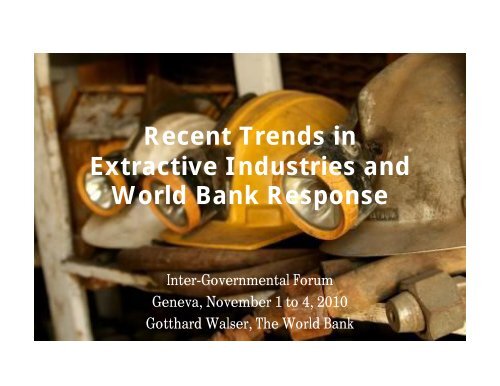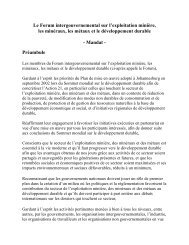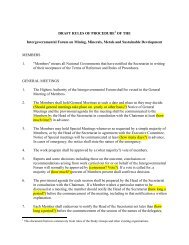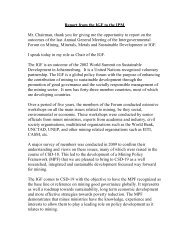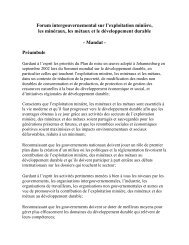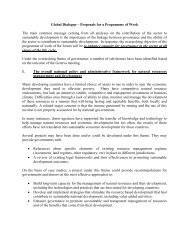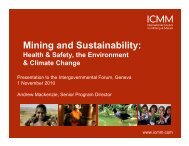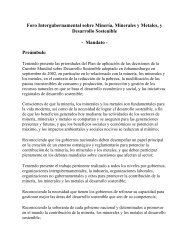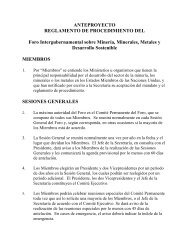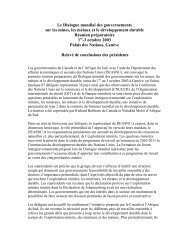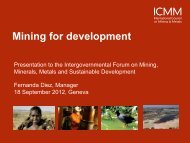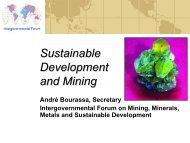Recent Trends in Extractive Industries and World Bank Response
Recent Trends in Extractive Industries and World Bank Response
Recent Trends in Extractive Industries and World Bank Response
You also want an ePaper? Increase the reach of your titles
YUMPU automatically turns print PDFs into web optimized ePapers that Google loves.
<strong>Recent</strong> <strong>Trends</strong> <strong>in</strong><br />
<strong>Extractive</strong> <strong>Industries</strong> <strong>and</strong><br />
<strong>World</strong> <strong>Bank</strong> <strong>Response</strong><br />
Inter-Governmental Forum<br />
Geneva, November 1 to 4, 2010<br />
Gotthard Walser, The <strong>World</strong> <strong>Bank</strong>
Overview<br />
<strong>Recent</strong> Developments <strong>in</strong> the <strong>Extractive</strong> <strong>Industries</strong><br />
Role of Emerg<strong>in</strong>g Players<br />
Flexible Fiscal Regimes<br />
Renegotiation <strong>and</strong> Nationalization<br />
Susta<strong>in</strong><strong>in</strong>g Community Benefits<br />
Regional <strong>and</strong> National Development<br />
<strong>World</strong> <strong>Bank</strong> <strong>Response</strong><br />
<strong>World</strong> <strong>Bank</strong> Group – Oil, Gas <strong>and</strong> M<strong>in</strong><strong>in</strong>g Policy Division<br />
EITI++/Value Cha<strong>in</strong> approach<br />
Lend<strong>in</strong>g, Non-lend<strong>in</strong>g, <strong>and</strong> Global Partnerships
Part I - <strong>Recent</strong> Developments <strong>in</strong><br />
the <strong>Extractive</strong> <strong>Industries</strong><br />
Commodity prices have gone through the full cycle, but<br />
the mid-term fundamentals rema<strong>in</strong> the same:<br />
Governments rema<strong>in</strong> key players <strong>in</strong> foster<strong>in</strong>g enabl<strong>in</strong>g<br />
environment for susta<strong>in</strong>able development of the sector<br />
Companies struggle to have access to new resources,<br />
but cont<strong>in</strong>ue to value stable <strong>and</strong> transparent countries<br />
Good governance on expenditures is key to maximize<br />
contribution to the economy
What’s New?<br />
Dem<strong>and</strong> from emerg<strong>in</strong>g markets (BRICs) is expected<br />
to rema<strong>in</strong> strong over the medium term<br />
BRIC companies are <strong>in</strong>creas<strong>in</strong>gly <strong>in</strong>vest<strong>in</strong>g <strong>in</strong><br />
extractive <strong>in</strong>dustries abroad <strong>and</strong> chang<strong>in</strong>g the<br />
traditional play<strong>in</strong>g field<br />
Despite the rise <strong>in</strong> fiscal revenues, many governments<br />
still believe profits aren’t shared equitably <strong>in</strong> high price<br />
period<br />
Resource nationalism rema<strong>in</strong>s high, but sometimes fed<br />
on unrealistic expectations<br />
Avoid<strong>in</strong>g local conflict, particularly around m<strong>in</strong><strong>in</strong>g<br />
areas, will play an <strong>in</strong>creas<strong>in</strong>gly important role <strong>in</strong><br />
success of extractive <strong>in</strong>dustries ventures<br />
Climate change agenda puts spotlight on use of fossil<br />
fuels
What’s New?<br />
Last but not least, the importance of<br />
governments geo-data acquisition <strong>and</strong><br />
management is <strong>in</strong>creas<strong>in</strong>gly recognized to<br />
reduce “knowledge asymetry” <strong>and</strong><br />
promote more equitable sector<br />
<strong>in</strong>vestments<br />
(ref Prof. Collier’s: underground value of 1<br />
square kilometer represents USD125,000<br />
<strong>in</strong> OECD countries <strong>and</strong> USD25,000 <strong>in</strong><br />
African countries)
Role of Emerg<strong>in</strong>g Players<br />
Important transfer of power from traditional western<br />
companies to firms headquartered <strong>in</strong> BRICs (m<strong>in</strong><strong>in</strong>g) <strong>and</strong><br />
national oil companies (petroleum)<br />
Non-traditional companies have different f<strong>in</strong>ancial models <strong>and</strong><br />
perceptions of risk than western firms; former often <strong>in</strong>vest<br />
where latter are reluctant (under new models)<br />
In the long-run, the perception of risk <strong>and</strong> profitability of the<br />
two groups should converge; similarly for corporate behavior<br />
with respect to the environment <strong>and</strong> social responsibility
Governments Want a Better<br />
Upside from Investments<br />
Taxation: predictable flexibility<br />
M<strong>in</strong><strong>in</strong>g sector saw negotiation of new frameworks to share<br />
revenues dur<strong>in</strong>g good times, e.g., resource rent taxes, w<strong>in</strong>dfall<br />
profits taxes, slid<strong>in</strong>g scale royalties <strong>and</strong> renegotiation of<br />
“unfair” contracts
Risk-Shar<strong>in</strong>g <strong>in</strong> the Upside & Downside<br />
Countries turned to state-owned equity participation,<br />
nationalization to <strong>in</strong>crease upside<br />
Companies historically bore most risk (except very large<br />
downturns)<br />
Then governments began to share <strong>in</strong> upside ‘risk’ (slid<strong>in</strong>g<br />
royalties; extraord<strong>in</strong>ary profits tax)<br />
Movement to equity stake means more shar<strong>in</strong>g of downside<br />
risk<br />
Decentralization of revenues implies <strong>in</strong>tra-governmental risk<br />
shar<strong>in</strong>g
Susta<strong>in</strong><strong>in</strong>g Community Benefits<br />
Countries call<strong>in</strong>g for more local economic development:<br />
more jobs, <strong>in</strong>creased local content, more <strong>in</strong>tegrated<br />
<strong>in</strong>frastructure development<br />
Viable society/community/environment after closure<br />
Development of alternative livelihoods, diversification of<br />
economy; development of <strong>in</strong>frastructure that will support other<br />
<strong>in</strong>dustries<br />
Transferrable skills development<br />
Capacity build<strong>in</strong>g for local governance, environmental<br />
management<br />
Distribution of revenues: how much back to the community?<br />
Some new players lack experience <strong>in</strong> deal<strong>in</strong>g with host<br />
communities <strong>in</strong> develop<strong>in</strong>g countries
Avoid<strong>in</strong>g the “Paradox of Plenty”<br />
Goes beyond sector policy:<br />
<br />
<br />
National strategy <strong>and</strong> <strong>in</strong>tegrated policies<br />
• Role of extractive <strong>in</strong>dustries <strong>in</strong> national development strategy<br />
• National level political <strong>in</strong>stitutions - <strong>in</strong>tegrated approach<br />
• Sector policy <strong>and</strong> governance<br />
Prudent macroeconomic policies<br />
• Policies to promote macro stability, with<strong>in</strong> well-def<strong>in</strong>ed<br />
medium-term expenditure framework<br />
• National <strong>in</strong>vestment plans - <strong>in</strong>frastructure, social <strong>in</strong>vestments<br />
• Development funds - all revenues/expenditures through<br />
Treasury/budget<br />
• No st<strong>and</strong> alone entity with discretionary spend<strong>in</strong>g power
Part II: <strong>World</strong> <strong>Bank</strong> <strong>Response</strong><br />
<strong>World</strong> <strong>Bank</strong> Group Role: Oil, Gas <strong>and</strong><br />
M<strong>in</strong><strong>in</strong>g Policy Division<br />
EITI++/Value Cha<strong>in</strong> Approach<br />
Lend<strong>in</strong>g <strong>and</strong> Non-lend<strong>in</strong>g Activities<br />
Global Programs <strong>and</strong> Partnerships
<strong>World</strong> <strong>Bank</strong> Group Role<br />
<strong>Extractive</strong> <strong>Industries</strong> Review<br />
Strengthen governance <strong>and</strong> transparency<br />
Ensure that extractive <strong>in</strong>dustry benefits reach poor<br />
people<br />
Mitigate environmental <strong>and</strong> social risks<br />
Protect the rights of people affected by extractive<br />
<strong>in</strong>dustry <strong>in</strong>vestments
<strong>World</strong> <strong>Bank</strong> Oil, Gas <strong>and</strong><br />
M<strong>in</strong><strong>in</strong>g Policy Division<br />
<strong>World</strong> <strong>Bank</strong> oil, gas, <strong>and</strong> m<strong>in</strong><strong>in</strong>g sector expertise housed <strong>in</strong> Oil, Gas<br />
<strong>and</strong> M<strong>in</strong><strong>in</strong>g Policy Division<br />
Focus on three strategic areas:<br />
• <strong>Extractive</strong> <strong>Industries</strong> Sector Governance<br />
• Climate Change <strong>and</strong> Energy Security<br />
• Susta<strong>in</strong>able Development<br />
Specific emphasis is put on<br />
• Foster<strong>in</strong>g social dimensions <strong>and</strong> partnerships with CSOs<br />
• Ma<strong>in</strong>stream<strong>in</strong>g gender <strong>and</strong> key global programs <strong>in</strong>to operations<br />
• Develop<strong>in</strong>g a bus<strong>in</strong>ess l<strong>in</strong>e on m<strong>in</strong><strong>in</strong>g-related <strong>in</strong>frastructure<br />
‣ EITI++ provides overarch<strong>in</strong>g, guid<strong>in</strong>g pr<strong>in</strong>ciples<br />
‣ Assistance is provided via lend<strong>in</strong>g operations, technical advisory<br />
services, analysis/publications, <strong>and</strong> global programs <strong>and</strong><br />
partnerships
EITI++: Sound Governance<br />
along the Value Cha<strong>in</strong><br />
EITI++, or the value cha<strong>in</strong> approach, is a comprehensive,<br />
<strong>in</strong>tegrated approach to the management of extractive<br />
<strong>in</strong>dustry resources, to help resource-rich countries to<br />
leverage natural resource wealth for susta<strong>in</strong>able development<br />
+ EITI +<br />
Nonrenewable<br />
resources<br />
Access to<br />
resources<br />
Monitor<strong>in</strong>g<br />
of EI<br />
operations<br />
Collection<br />
of taxes +<br />
royalties<br />
Revenue<br />
management<br />
+ allocation<br />
Susta<strong>in</strong>able<br />
utilization of<br />
resources<br />
Inclusive &<br />
Susta<strong>in</strong>able<br />
Development<br />
The EITI++ approach has been used successfully by the<br />
Government of DRC to design a TA Project; now be<strong>in</strong>g a[[lied<br />
<strong>in</strong> Cameroon <strong>and</strong> Mauritania
Achiev<strong>in</strong>g Better Governance<br />
along the Value Cha<strong>in</strong><br />
Satisfactory legal, fiscal, <strong>and</strong> regulatory frameworks<br />
Capacity build<strong>in</strong>g to put <strong>in</strong> place modern licens<strong>in</strong>g systems <strong>and</strong><br />
<strong>in</strong>stitutional frameworks, <strong>in</strong>stitutional capabilities to ensure<br />
<strong>in</strong>vestor compliance with applicable laws <strong>and</strong> regulations, <strong>and</strong><br />
to protect <strong>in</strong>vestor contractual rights<br />
Transparent <strong>and</strong> efficient revenue collection capabilities to<br />
maximize the generation of revenues over time<br />
Adequate revenue management for susta<strong>in</strong>able socioeconomic<br />
development<br />
Benefit shar<strong>in</strong>g agreements with regions/communities<br />
Satisfactory environmental <strong>and</strong> social protection framework<br />
<strong>and</strong> procedures to make local communities benefit from<br />
operations
Mitigat<strong>in</strong>g Social <strong>and</strong><br />
Environmental Risks<br />
Environmental, health, <strong>and</strong> safety regulations<br />
Environmental Impact Assessments (<strong>in</strong>cl. basel<strong>in</strong>e data),<br />
Environmental Management Plans, M<strong>in</strong>e Closure <strong>and</strong> Oil<br />
Decommission Plans<br />
Social Impact Assessments, <strong>in</strong>clud<strong>in</strong>g identification of affected<br />
communities members <strong>and</strong> vulnerable groups (gender, youth)<br />
Generat<strong>in</strong>g community benefits by broaden<strong>in</strong>g economic<br />
opportunities (l<strong>in</strong>kages): Regional Development Plans,<br />
Community Consultation Frameworks, Community<br />
Development Plans<br />
Enhanced Oversight, Monitor<strong>in</strong>g <strong>and</strong> <strong>in</strong>spection capacity<br />
Assistance <strong>in</strong> prudent local government use of revenues<br />
Introduction of more environmentally friendly artisanal m<strong>in</strong><strong>in</strong>g<br />
techniques
A Strong Focus on Africa<br />
Our Unit provides global expertise <strong>and</strong> operational<br />
support <strong>in</strong> more than 70 countries around the world,<br />
with a strong focus to Africa
Support<strong>in</strong>g the Value Cha<strong>in</strong>:<br />
Lend<strong>in</strong>g Operations<br />
The Oil, Gas <strong>and</strong> M<strong>in</strong><strong>in</strong>g Policy Unit delivers assistance<br />
<strong>in</strong>ter alia via lend<strong>in</strong>g TA operations - the Unit currently<br />
manages 18 projects, <strong>and</strong> is work<strong>in</strong>g with several countries on<br />
preparation of others<br />
Oil, Gas <strong>and</strong> M<strong>in</strong><strong>in</strong>g Policy Unit Lend<strong>in</strong>g Operations (<strong>in</strong>cl. Supplemental/Additional F<strong>in</strong>anc<strong>in</strong>g)<br />
Actual<br />
Plan<br />
Zambia Copperbelt (FY03)<br />
Madagascar M<strong>in</strong><strong>in</strong>g TA (FY03)<br />
Mauritania M<strong>in</strong><strong>in</strong>g TA (FY04<br />
Ug<strong>and</strong>a M<strong>in</strong><strong>in</strong>g TA (FY04)<br />
Nigeria M<strong>in</strong><strong>in</strong>g TA (FY05)<br />
Afghanistan Nat. Resources (FY06)<br />
Mauritania Suppl. for Petrol (FY07)<br />
Liberia M<strong>in</strong><strong>in</strong>g TA<br />
Madagascar Suppl. (FY07)<br />
Mongolia M<strong>in</strong><strong>in</strong>g TA (FY08)<br />
PNG M<strong>in</strong><strong>in</strong>g TA II(FY08)<br />
Ug<strong>and</strong>a AF (FY09)<br />
Tanzania M<strong>in</strong><strong>in</strong>g TA (FY09)<br />
Afghanistan AF (FY09)<br />
DRC M<strong>in</strong><strong>in</strong>g TA (FY10)<br />
Lao Hydro Power for M<strong>in</strong><strong>in</strong>g<br />
Pakistan Thar Coal to Power<br />
Balochistan M<strong>in</strong><strong>in</strong>g TA<br />
Mongolia M<strong>in</strong><strong>in</strong>g TA II<br />
Cameroon M<strong>in</strong><strong>in</strong>g TA<br />
Malawi M<strong>in</strong><strong>in</strong>g TA<br />
Africa M<strong>in</strong>eral Governance<br />
(regional project) -<br />
possible countries to be<br />
<strong>in</strong>cluded:<br />
-Burk<strong>in</strong>a Faso<br />
-Cote d’Ivoire<br />
-Gu<strong>in</strong>ea<br />
-Sierra Leone<br />
The Unit supports other <strong>World</strong> <strong>Bank</strong> teams on oil, gas, <strong>and</strong> m<strong>in</strong><strong>in</strong>g<br />
components of lend<strong>in</strong>g operations: Botswana, Ghana, Kosovo, Mali,<br />
Philipp<strong>in</strong>es, Rep. of Congo, Romania, <strong>and</strong> Sao Tome & Pr<strong>in</strong>cipe
Typical lend<strong>in</strong>g operations are delivered through technical<br />
assistance projects (TA) that support key aspects of the<br />
<strong>Bank</strong>’s Oil <strong>and</strong> M<strong>in</strong><strong>in</strong>g Sector Reform (EIR) agenda:<br />
Creation of suitable legal <strong>and</strong> regulatory<br />
frameworks<br />
Institutional capacity build<strong>in</strong>g<br />
<br />
<br />
<br />
Support<strong>in</strong>g the Value Cha<strong>in</strong>:<br />
Lend<strong>in</strong>g Operations (2)<br />
Collection of geological data<br />
Susta<strong>in</strong>able development through environmental<br />
management systems <strong>and</strong> social benefits to local<br />
communities <strong>and</strong> economies<br />
Support of artisanal <strong>and</strong> small-scale m<strong>in</strong><strong>in</strong>g
Support<strong>in</strong>g the Value Cha<strong>in</strong>: Technical<br />
Advisory Assistance<br />
In addition to lend<strong>in</strong>g operations, the Unit provides technical<br />
advisory assistance to many countries on issues along the<br />
value cha<strong>in</strong>, for <strong>in</strong>stance most recently <strong>in</strong>:<br />
M<strong>in</strong><strong>in</strong>g: Angola, Albania, Armenia, CAR, Cameroon,<br />
Colombia, Ethiopia, India, Niger, Solomon Isl<strong>and</strong>s, Philipp<strong>in</strong>es,<br />
Saudi Arabia, Yemen<br />
Petroleum: Bangladesh, Bolivia, Cambodia, Rep. of<br />
Congo, Cote d’Ivoire, Ghana, Palau, Peru, Sudan, Vietnam,<br />
West <strong>Bank</strong> <strong>and</strong> Gaza
Analytical Work/Publications<br />
The Unit also has an active program of knowledge<br />
management, <strong>in</strong>clud<strong>in</strong>g most recently <strong>in</strong> the follow<strong>in</strong>g areas:<br />
M<strong>in</strong><strong>in</strong>g: M<strong>in</strong><strong>in</strong>g Together, M<strong>in</strong><strong>in</strong>g Cadastres, F<strong>in</strong>ancial Surety for<br />
M<strong>in</strong>e Closure, West <strong>and</strong> Central Africa Alum<strong>in</strong>um Study,<br />
Experience with M<strong>in</strong><strong>in</strong>g Foundations, Local Economic<br />
Development, Country-specific M<strong>in</strong><strong>in</strong>g Sector Reviews<br />
Petroleum: Higher Oil Prices <strong>and</strong> the Poor, Survey of<br />
Petroleum Environmental Management, Downstream Petroleum<br />
Markets <strong>in</strong> SSA, Oil Ref<strong>in</strong>eries <strong>in</strong> SSA, Allocation of Petroleum<br />
E&P Rights, National Oil Companies, Gas for the Poor, Countryspecific<br />
Petroleum Sector Analysis<br />
Global: EITI++/Value Cha<strong>in</strong> Approach, Decommission<strong>in</strong>g of Oil,<br />
Gas <strong>and</strong> M<strong>in</strong><strong>in</strong>g Operations, Petroleum <strong>and</strong> M<strong>in</strong><strong>in</strong>g Fiscal<br />
Regimes, Engagement with Civil Society <strong>in</strong> <strong>Extractive</strong> <strong>Industries</strong>
Global Programs <strong>and</strong> Partnerships<br />
The <strong>World</strong> <strong>Bank</strong> Oil, Gas <strong>and</strong> M<strong>in</strong><strong>in</strong>g Policy Unit manages 5 Global<br />
Programs <strong>and</strong> Partnerships:<br />
<strong>Extractive</strong> <strong>Industries</strong> Transparency Initiative (EITI)<br />
<strong>Extractive</strong> <strong>Industries</strong> Technical Advisory Facility (EI-TAF)<br />
Global Gas Flar<strong>in</strong>g Reduction Partnership (GGFR)<br />
Communities <strong>and</strong> Small-scale M<strong>in</strong><strong>in</strong>g Partnership (CASM)<br />
Petroleum Governance Initiative (PGI)
<strong>Extractive</strong> <strong>Industries</strong> Technical Advisory<br />
Facility (EI-TAF)<br />
New multi-donor trust fund, EI-TAF objectives <strong>in</strong>clude to:<br />
<br />
<br />
Address country dem<strong>and</strong> for “rapid-response” advisory<br />
services <strong>in</strong> the oil, gas, <strong>and</strong> m<strong>in</strong><strong>in</strong>g sectors, particularly to<br />
address issues <strong>in</strong> the ‘upstream’ portion of the value cha<strong>in</strong>;<br />
Contribute to global knowledge management <strong>in</strong> extractive<br />
<strong>in</strong>dustries sector governance through the gather<strong>in</strong>g <strong>and</strong><br />
dissem<strong>in</strong>ation of good practices <strong>in</strong> EI sector governance<br />
EI-TAF assistance aims to level the play<strong>in</strong>g field between client<br />
countries <strong>and</strong> EI firms <strong>and</strong> help to ensure that resource-rich<br />
develop<strong>in</strong>g countries, <strong>and</strong> ultimately their citizens, benefit from<br />
the exploitation of their extractive resources
Communities <strong>and</strong> Small-scale<br />
M<strong>in</strong><strong>in</strong>g Partnership (CASM)<br />
CASM’s objective is to reduce poverty by improv<strong>in</strong>g the<br />
environmental, social, <strong>and</strong> economic performance of artisanal<br />
<strong>and</strong> small-scale m<strong>in</strong><strong>in</strong>g <strong>in</strong> develop<strong>in</strong>g countries<br />
Is a network, coord<strong>in</strong>ation, <strong>and</strong> knowledge clear<strong>in</strong>g house<br />
facility<br />
After 10 years of successful activities, CASM is now <strong>in</strong> the<br />
process of re-<strong>in</strong>vent<strong>in</strong>g itself to adjust to the realities of the<br />
second decade of the century<br />
Follow up on www.artisanalm<strong>in</strong><strong>in</strong>g.org
Conclusion: Some of the WB Present Key Focus<br />
of Attention:<br />
Implement the EITI++ value cha<strong>in</strong> approach to design<br />
m<strong>in</strong><strong>in</strong>g policy <strong>and</strong> implementation <strong>in</strong> client countries<br />
Contract <strong>and</strong> community agreement model<br />
Integration of gender issues <strong>in</strong> m<strong>in</strong><strong>in</strong>g<br />
Rapid support to governments regard<strong>in</strong>g contracts<br />
negotiations <strong>and</strong> policy implementation(EI-TAF)<br />
Revenues distribution mechanisms <strong>and</strong> capacity at<br />
local level<br />
Political economy analyses <strong>and</strong> economic governance<br />
guidance <strong>in</strong> EI sector<br />
Geo-data acquisition <strong>and</strong> management
Thank you!


